#Richard Hugo poet
Explore tagged Tumblr posts
Note
I wanna start writing poetry but i have no idea where to start or how to properly express my feelings
Don't chase after poetry. It lies dormant inside you. Like a shadow. It reveals itself at the right time. In the right light. At least, this was how it was for me. When I needed poetry—there it was.
But what do I know of poetry? Here are what some great poets have to say:
“A poet is, before anything else, a person who is passionately in love with language.” —W. H. Auden
Are you passionately in love with language?
“Poetry is the spontaneous overflow of powerful feelings: it takes its origin from emotion recollected in tranquility.” —William Wordsworth
You say you have the feelings, but you have no idea how to properly express them yet. Try to get to that place of tranquility and recollect those emotions. Then perhaps poetry will flow out of you.
“Don't write love poems when you're in love. Write them when you're not in love.” —Richard Hugo
It's not impossible to write when you're in love. But it is difficult. And personally, I find that's when too many adverbs show up.
“A poem begins as a lump in the throat, a sense of wrong, a homesickness, a lovesickness.” —Robert Frost
You already have those feelings. It seems you already have the beginnings of a poem.
“If I feel physically as if the top of my head were taken off, I know that is poetry.” —Emily Dickinson
I remember writing my first "poem," and asking myself, "Is this even a poem? Does it have enough rhymes, pretty imagery, are the metaphors intricate enough?" So after having written your poem, read it. If you feel physically as if the top of your head were taken off, you will know it is poetry.
“All bad poetry springs from genuine feeling.” —Oscar Wilde
And if you feel like you have written a "bad" poem, that just means your feelings were genuine. And when that happens—when you have become your own worst critic—I would say, you are now a poet.
To answer your question more technically, here are some posts I have on poetry: Poetic Genres A List of Poetic Terms
A few writing prompts that might inspire you: Lemons Untitled A Poetic Map No Words Word Lists
And here are some articles: How to Write Poetry Writing Your Own Poem Poetry: What is being said and how is it expressed?
If this (in any way) helps you write your poem, I would love to read it. If you don't mind :)
#ask#writeblr#spilled ink#poets on tumblr#poetry#writers on tumblr#literature#creative writing#on writing#quotes#poems#lit#writing tips#writing advice#writing inspiration#dark academia#light academia#writing reference#writing resources#wh auden#william wordsworth#richard hugo#robert frost#emily dickinson#oscar wilde
89 notes
·
View notes
Text

American poet Richard Hugo
#Hugo#Richard Hugo#Richard Franklin Hogan#Hogan#1900's#1980's#American#America#USA#United States#US#poetry#poet#1982#1923#1920's#Washington#Seattle
4 notes
·
View notes
Text
"Isn’t this your life? That ancient kiss / still burning out your eyes?"
Read it here | Reblog for a larger sample size!
#polls#poetry#poems#poetry polls#poets and writing#tumblr poetry#have you read this#degrees of gray in philipsburg#richard hugo#closed polls#never heard of#admin faves
2 notes
·
View notes
Text
THE ADVENTURES OF PRISCILLA, QUEEN OF THE DESERT:
Drag Queens hit the road
Bring lots of sass and Sashay
Lost in the outback
youtube
#priscilla queen of the desert#random richards#poem#haiku#poetry#haiku poem#poets on tumblr#haiku poetry#haiku form#poetic#the adventures of priscilla queen of the desert#drag queen#terence stamp#hugo weaving#guy pearce#Stephan Elliott#Youtube
0 notes
Text
If you are a private poet, then your vocabulary is limited by your obsessions. It doesn't bother me that the word 'stone' appears more than thirty times in my third book, or that 'wind' and 'gray' appear over and over in my poems to the disdain of some reviewers. If I didn't use them that often I'd be lying about my feelings, and I consider that unforgivable. In fact, most poets write the same poem over and over.
The Triggering Town by Richard Hugo
112 notes
·
View notes
Text
In The Triggering Town, poet Richard Hugo explains that the subject that gets you started writing a poem is often only a starting place to work from until the poem reveals its truer subject. He writes, “Somehow you must switch your allegiance from the triggering subject to the words”–which is another way of saying that what your novel tells you it wants to be is ultimately more important than what you wanted it to be when you began.
- Matt Bell, Refuse to Be Done: How to Write and Rewrite a Novel in Three Drafts
#quote#matt bell#refuse to be done#writing#writeblr#writing resources#writing advice#writing quotes#writing tips
8 notes
·
View notes
Text
list of pdfs on my phone because i know everyone wants to find out
race, discourse, and the origin of the americas: a new world view (many authors. i'm not writing all that)
what is to be done? (vladimir lenin)
"chemistry and the 19th-century american pharmacist" (gregory j. higby)
the torture garden (octave mirbeau)
"the vane sisters" (vladimir nabokov) + questions for discussion
"the tell-tale heart" (edgar allan poe)
"the lottery" (brainerd duffield)
slideshow about different english cities during the industrial revolution
the compleat works of nostradamus
"terms of endearment in english" (julia landmann)
"speech reflections in late modern english pauper letters from dorset" (anne-christine gardner)
"slopjank prographilose" (rose q. drifting & magnesium oxide)
a few pages of the 1897 sears, roebuck & co. catalog + some other related things
orientalism (edward said)
"in event of moon disaster" (bill safire)
ragtime (e. l. doctorow)
enough to make you blush: exploring erotic humiliation (princess kali)
"you're a mean one, mr. grinch" (dr. seuss) + close reading questions
merry muses of caledonia (robert burns)
"women and the english civil wars" lesson outline
"the concept of the left" (leszek kołakowski)
"kids in the early 1900s" (betty debnam)
"heterosexualism and the colonial/modern gender system" (maría lugones)
"for heidi with blue hair" (fleur adcock)
"flowers for algernon" (daniel keyes)
excerpt of the beginning of m*a*s*h (tim kelly)
tristan tzara poetry collection
"the nature of the beast: the portrayal of satan in the ballads of seventeenth century england" (christopher bailey)
"all the king's horses" (kurt vonnegut)
"conditional divorce in ottoman society: a case from seventeenth-century erzurum" (bilgehan pamuk)
"gender oppression in the enlightenment era" (barbara cattunar)
who's afraid of virginia woolf? (edward albee)
"visual difference & disfigurement in the arts"
"trans-misogyny primer" (julia serano)
the brothers karamazov (fyodor dostoyevsky)
the other victorians: a study of sexuality and pornography in mid-nineteeth century england (steven marcus)
the mistborn trilogy (brandon sanderson)
"the life of an unknown assassin: leon czolgosz and the death of william mckinley" (cary federman)
the brothers karamazov (fyodor dostoyevsky) again
spanish idioms with their english equivalents: embracing nearly ten thousand phrases (sarah cary becker & federico mora)
a sensation novel (w. s. gilbert)
basic principles of marxism–leninism: a primer (jose maria sison)
russia under the old regime (richard pipes)
tristan tzara: dada and surrational theorist (elmer peterson)
pan tadeusz (adam mickiewicz)
psycho nymph exile (porpentine heartscape)
1984 (george orwell)
neath to reach zine: the traveler's guide to [illegible] (i am not writing all that!!)
the dada painters and poets: an anthology (i continue to not write all that)
machine of death (still not writing all that)
"merchants, proto-firms, and the german industrialization: the commercial determinants of nineteenth century town growth" (gavin greif)
"introduction to the history of mental illness"
"girl detective & the mystery of the sap-stained skirt" (porpentine heartscape)
gadsby (ernest vincent wright)
feeling very strange: the slipstream anthology (authors galore.)
english women's clothing in the nineteeth century (c. willett cunnington)
socialism: utopian and scientific (friedrich engels)
the waste land (t. s. eliot)
"debility and disability in edith wharton's novels" (karen weingarten)
death of riley (rhys bowen)
"the black vampyre: a legend of st. domingo" (uriah derick d'arc)
raoul hausmann and berlin dada (timothy o. benson)
flight out of time: a dada diary by hugo ball
art and production (boris arvatov)
"the culture industry: enlightenment as mass deception" (theodor adorno & max horkheimer)
a gilded lady (elizabeth camden)
"changing narratives of martyrdom in the works of huguenot printers during the wars of religion" (byron j. hartsfield)
112 gripes about the french
"the spelling of the country name "romania" in british official usage: from uncertainty to standardization" (paul woodman)
"sarajevo 1914: trial process against young bosnia – illusion of the fair process" (veljko m. turanjanin & dragana s. čvorović)
7 notes
·
View notes
Text
Iconic Mont Saint-Michel Abbey celebrates 1,000 years
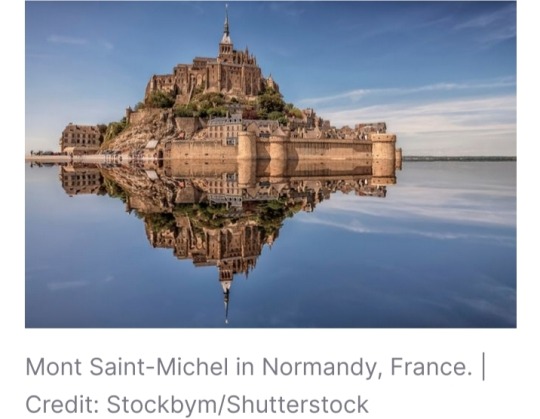
By Solène Tadié
13 June 2023
It was exactly a millennium ago that the first stone of the abbey church of Mont Saint-Michel in French Normandy was laid.
The monument that the poet Victor Hugo called the “Khéops of the West” has since become one of the highest symbols of French Catholic identity and one of the most important pilgrimage sites in the world, with more than 3 million visitors a year.
This important anniversary will give rise to a number of celebrations that will continue through the fall of 2023.
Standing on relatively inhospitable terrain, enthroned on a rocky islet less than a kilometer in diameter, surrounded by a vast sandy plain subject to the vagaries of the tides, the UNESCO World Heritage Site has stood the test of time, offering itself as a spectacle for dozens of generations to see.
Indeed, the history of this place of prayer and pilgrimage was as precarious and tumultuous as its surroundings.
While the construction of the present abbey church dates back to 1023, a first church dedicated to St. Michael the Archangel is said to have been built as early as 708 on the mount, then known as Mont-Tombe.
According to “Revelation,” the oldest text reporting the context of the abbey’s construction (written around the beginning of the 11th century), St. Aubert, then-bishop of Avranches, was visited three times in a dream by the archangel, who instructed him to erect a sanctuary in his honor on the summit of the site “so that he whose venerable commemoration was celebrated at Mont Gargan [the first great shrine dedicated to the Leader of the Celest Army, in the Puglia region of Italy] might be celebrated with no less fervor in the middle of the sea.”
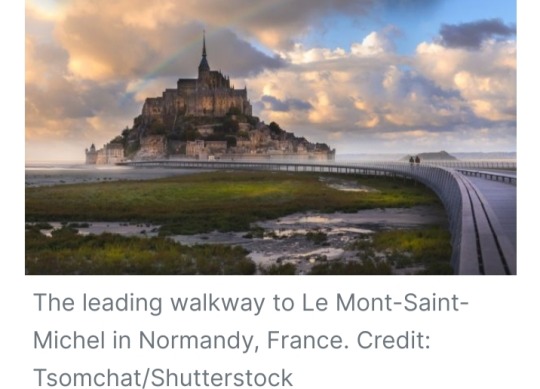
St. Aubert undertook the building of a first church with the capacity of about a hundred people, consecrated in October 709 and given the name Mont-Saint-Michel-au-péril-de-la-Mer.
The prelate installed 12 canons there, responsible for praying the Divine Office and welcoming local pilgrims.
The canons were replaced in the 10th century by Benedictine monks at the behest of Richard I, Duke of Normandy, who had little taste for the canons’ opulent lifestyle.
In 1023, the order undertook the construction of the abbey church we know today, based on three rock-cut crypts and the former chapel.
This ambitious project marked a decisive step in the international outreach of the site, where miracles abounded as the flow of pilgrims from all over Christendom expanded.
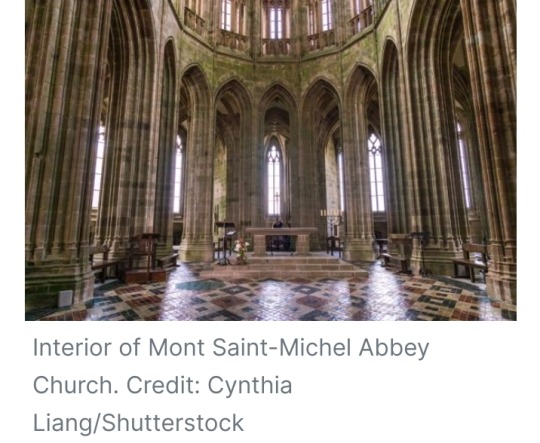
“This edifice is like Noah’s ark laid over the crypts,” said François Saint-James, a guide and lecturer at Mont Saint-Michel, in an interview with Le Devoir newspaper, underlining the architectural prowess required for this medieval project.
“It was a time when France was covered with a white cloak of churches, as a monk from Cluny once wrote. You have to imagine the gigantic scale of the work.
The granite blocks were cut on the Chausey islands, 34 kilometers from here.
Caen stone, a soft, light stone that’s easy to carve, was used. ... When, in the midst of the Hundred Years’ War, the Romanesque choir collapsed, it was rebuilt in flamboyant Gothic style.”
While the abbey’s architectural evolution continued uninterrupted until the 19th century, one of its highest points was the construction of “La Merveille” (The Wonder) in the 13th century, a jewel of Norman Gothic art.
It consists of two buildings on three levels, supported by high buttresses, with a cloister and refectory, 80 meters above sea level, beneath which were built an almshouse, a storeroom, and guest rooms.

The fame of the shrine started to decline in the 17th century, when part of the abbey was turned into a prison by the royal power.
Seized by central government during the revolution, it became a detention center for priests deemed hostile to the Jacobin terror.
In the 19th century, the site, listed as a historic monument in 1874, was gradually returned to monastic life and its original vocation as a sanctuary.
The abbey’s distinctive silhouette was further enhanced by a neo-Gothic spire in 1897, topped by a gilded statue of the archangel.
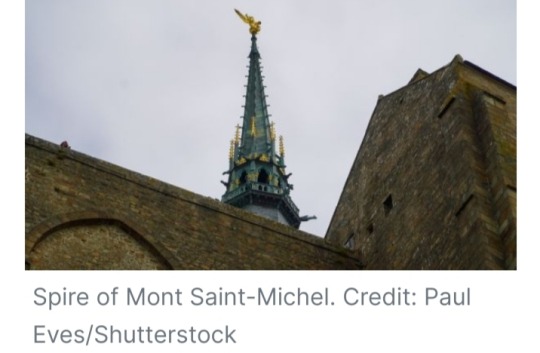
To mark its 1,000th anniversary, a special tribute is being paid to the abbey that many have dubbed the “Wonder of the West” with the exhibition “La Demeure de l’Archange” (The Archangel’s Abode), retracing its glorious and tumultuous history through some 30 masterpieces, until November 5.
Many of these items, which include sculptures, scale models, statues, and silverware, will be on display to visitors to the abbey for the first time.
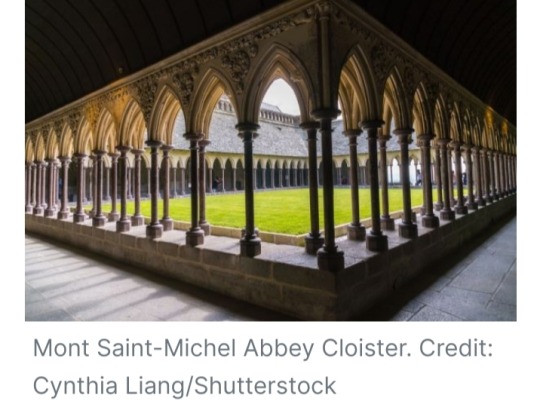
Another highlight of the many celebrations taking place over the summer and part of the autumn will be the “Millennium Solstice,” a never-before-seen light show projected onto Mont Saint-Michel from various spots in the bay on the evening of June 23.
The beauty of this sacred site, trodden by millions of pilgrims over the centuries, has been celebrated and immortalized in the writings of many great men of letters over the last few centuries, from Gustave Flaubert to Théophile Gautier and Victor Hugo.
In particular, it inspired the novel “Les Merveilles du Mont Saint-Michel” (1879) by the prolific writer Paul Féval.
He had already paid tribute to the monument a few years earlier, in “La Fée des grèves,” with these lines often quoted by admirers of the famous Mont:
“Twilight broke. Mont-Saint-Michel was the first to emerge from the shadows, offering the golden wings of its archangel to the reflections of the dawning dawn; then the sides of Normandy and Brittany lit up in turn.
Then again, a sort of light steam seemed to rise from the receding sea, and all was veiled except for the statue of Saint Michael, which dominated this wide ocean of mist.”
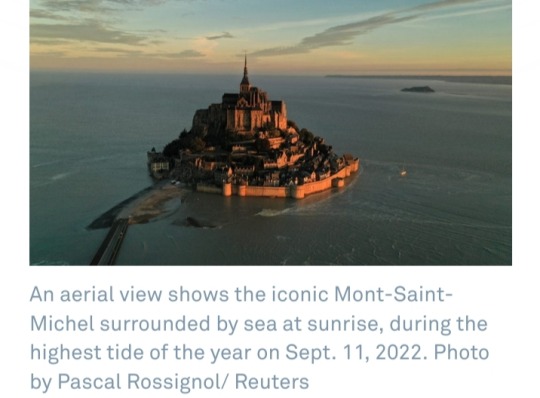
#Mont Saint-Michel#Khéops of the West#Victor Hugo#UNESCO World Heritage Site#pilgrimage#St. Aubert#Revelation#Mont-Saint-Michel-au-péril-de-la-Mer#Richard I#Duke of Normandy#La Demeure de l’Archange#The Archangel’s Abode#Millennium Solstice#Gustave Flaubert#Théophile Gautier#Paul Féval#Les Merveilles du Mont Saint-Michel#La Fée des grèves#St. Michael the Archangel
28 notes
·
View notes
Text

FLP CHAPBOOK OF THE DAY: Near Afar by Richard Wilkinson
On SALE now! Pre-order Price Guarantee: https://www.finishinglinepress.com/product/near-afar-by-richard-wilkinson/
Retiring after nearly fifty years of working served as the spark for Near Afar. The book celebrates a journey of adventure, romance, and wonder while wrestling with that age old question, “What’s next?” Blending the playful with the deeply reflective, Near Afar employs a wide range of poetic forms commensurate with the diversity of experiences it covers. The reader will find ekphrastic, concrete, found, abecedarian, villanelle, and prose #poetry among the more familiar lyric styles. #travel #life #journey
Richard Wilkinson lives and writes in Tacoma, Washington. He is indebted to the 2013 Whidbey Island (WA) Writers Conference and Seattle’s Hugo House writing center for his development as a poet.
PRAISE FOR Near Afar by Richard Wilkinson
“The poems in Richard Wilkinson‘s Near Afar travel from the moon to moonshadow, from California to Kobe, from Afar (in Ethiopia) to tender reflection and love. An engaging and delightful read.”
–Priscilla Long, author of Crossing Over: Poems and Holy Magic
Please share/please repost #flpauthor #preorder #AwesomeCoverArt #poetry #chapbook #read #poems #travel
#poetry#flp authors#preorder#flp#poets on tumblr#american poets#chapbook#chapbooks#finishing line press#small press
1 note
·
View note
Text
Mary Lattimore — Goodbye Hotel Arkada (Ghostly)

Photo by Daniel Boczarski
The late poet Richard Hugo, in his slim essay collection The Triggering Town, presents a line — “That silo, filled with chorus girls and grain” — then asks us to “notice the word ‘that.’” With just this one word, we are on the scene with the poet, who is pointing at something; something palpable, something with a discernible, shape, setting, and surface. Not a silo, but that one. Even if you don’t know where precisely the poet has taken you, you know it is somewhere — and that, per Hugo, “is a source of stability” and earns the poet the authority to “indulge [their] flights” into the extraordinary. The harpist and composer Mary Lattimore’s latest album, Goodbye, Hotel Arkada, performs a similar trick. The certainty in her playing and the narrative clarity of her voice as an instrumentalist, composer, and weaver of sound convey a comparable authority and evoke the same sense of that, of somewhere — ��even if that somewhere lives only in the fragments of memories or the specters of dreams. Like Hugo’s poet, she points, dropping us into scenes that we believe and recognize, whether they’re real or imagined. Lattimore, like a great poet, opens a window in each song for the listener to take flights of their own.
Unlike the solitary poet that illustrates Hugo’s advice, though, Lattimore is an accomplished and frequent collaborator. She has found common cause with musicians across a wide sonic spectrum. In previous full lengths, she has mixed her harp’s erudition with artists as diverse as Superchunk’s Mac McCaughan, guitar explorer Paul Sukeena, and folk powerhouse Meg Baird, also featured here, among many others. Her experience melding the talents of disparate performers with her own comes alive on Goodbye, Hotel Arkada. While none of the six featured artists are credited on more than one track, the album has the feel of an ensemble cast. Their contributions are not just backing but lend drama and tension. This is storytelling music, complete with varied perspectives and nuanced characters.
“Arrivederci,” track two, features ex-The Cure drummer and keyboardist, Lol Tolhurst. His synthesizer, wistful and a little chilly, and Lattimore’s harp are in conversation: positing, responding and giving way. This is a duet, a dramatic dialogue, and Tolhurst is a formidable interlocutor. He starts brightly, his chords flowing and pliant, until, after a long passage from Lattimore, which sees her begin to play with greater determination, he rejoins with scratchy, persistent bass pulses. Tolhurst’s character eventually resorts to volume over reasoning. But, rather than be crushed under the weight of the bass, Lattimore continues to play with sparkling emphasis, adding more flourish, and, apparently, getting her point across, perhaps, per the title, saying goodbye for now, as Tolhurst’s keyboard lines return to their bright, ethereal beginnings.
If “Arrivederci” was a dialogue, a plot’s catalytic disagreement, then the following track, “Blender in a Blender,” featuring the guitarist and composer Roy Montgomery, is a Greek chorus zooming out to describe a ravaged world in flux, filling in macro, expository details as the characters continue on below. The song swoops and builds for almost five minutes as ominous keyboards and somber strings bear witness to the landscape, eventually fading to a contemplative silence, until an epochal torrent of keys storms back in from some shadowcast mountain range. It is martial, a threatening, destructive surge of sound, but soon it too is gone. The echoing, driving style is pure Montgomery and immediately recalls, in pace and rhythm, the tense, controlled waves of guitar from his 1996 album, Temple IV, though without quite the extremity of those reeling provocations. On an album that so often and ably shows a nuanced darkness underneath beauty, “Blender in a Blender,” given Montgomery’s presence, feels like a missed opportunity to escalate towards something more visceral.
While most of Goodbye, Hotel Arkada’s 42 minutes are spent in the company of Lattimore and at least one other musician, for a two song stretch, starting with the appropriately named “Music for Applying Shimmering Eye Shadow” and the somehow even more appropriately named “Horses, Glossy on the Hill,” Lattimore is showcased alone. Both have their moments: “Music…” finds a calm, evocative fullness in the trio of twinkling harp, bright but enveloping synths, and Lattimore’s textural breath, but it’s ”Horses…” that’s the standout performance, perhaps the most theatrical piece on a very theatrical album. It starts with knocks that can be nothing but the hooves of the eponymous horses, soon joined by Lattimore’s stuttering harp, which plinks just out of step, struggling but steady, just able to keep pace with the cavalcade. The line finds its stride in a passage of bright picking and strumming that’s ukulele-like in its taut simplicity. The climax is a stream of consciousness: echos and reverb, a blossoming, articulate medley of sound that loses none of its heft or form in the rush. While Lattimore’s effects pedals are a hallmark of her work and present throughout the album, “Horses, Glossy on the Hill,” stands out on Goodbye, Hotel Arkada for the vigor and intricacy with which she applies them, and for the complete vision she’s capable of conjuring in a soliloquy.
Delightful and inventive as Lattimore is on her own, Goodbye, Hotel Arkada is still most remarkable for its collective efforts. In the opening track, “And Then He Wrapped His Wings Around Me,” the accordionist Walt McClements’ nuanced drone and Baird’s articulate, wordless vocals, like Tolhurst’s keys, seem to inspire a greater tenacity in Lattimore’s playing, glissandi grow more insistent and her riffs more oratorial. In the closing track, “Yesterday’s Parties,” too, the presence of Slowdive’s Rachel Goswell vocals and Samara Lubelski’s luminous violin create a lovely, highly reflective fog that Lattimore’s playing reflects from, vibrant and beautiful into a controlled squall at the end. A Bandcamp supporter of Lattimore’s wrote, about her work with the drone group GROWING, that the music “highlights each participant’s strengths while bringing forth something new and wondrous.” This is also an apt description of Goodbye, Hotel Arkada, an album that, without lyrics, tells its stories with many voices and in a poetry that feels tangible, even as it transforms in front of us, catching more light in its sound as it blooms.
Alex Johnson
#mary lattimore#goodbye hotel arkada#ghostly international#alex johnson#albumreview#dusted magazine#harp#lol tolhurst#roy montgomery#meg baird#walt mcclements#rachel goswell#samara lubelski#Bandcamp
2 notes
·
View notes
Text
Looking for a book about writing poetry I saw a lot of recommendations for the triggering town by richard hugo and it took halfway the book before he even mentioned a female poet 🤡
8 notes
·
View notes
Text
2022 reads!
since everyone is doing this, i figured i might as well join in! i track my reading through thestorygraph and aim for 30 books in a year, though i don't usually count shorter texts read for class or the plays i skim when looking for material in my acting classes. favorites in each category are bolded. feel free to ask questions on any of these!
FICTION:
House of Leaves – Mark Z. Danielewski
Detransition, Baby – Torrey Peters
Sula – Toni Morrison
The Infinite Noise – Lauren Shippen
A Neon Darkness – Lauren Shippen
Some Faraway Place – Lauren Shippen
Gone Girl – Gillian Flynn
Paradise – Toni Morrison
Gideon the Ninth (Reread) – Tamsyn Muir
Harrow the Ninth (Reread) – Tamsyn Muir
Sharp Objects – Gillian Flynn
A Psalm for the Wild-Built – Becky Chambers
This is How You Lose the Time War – Max Gladstone & Amal El-Mohtar
The Seven Husbands of Evelyn Hugo – Taylor Jenkins Reid
A Room Called Earth – Madeleine Ryan
Nona the Ninth – Tamsyn Muir
Frankenstein (Reread) – Mary Shelley
Hell Followed with Us – Andrew Joseph White
Dracula (through Dracula Daily) – Bram Stoker
Eartheater – Dolores Reyes (trans. Julia Sanches)
My Heart is a Chainsaw – Stephen Graham Jones
Lolita – Vladimir Nabokov
NON-FICTION:
Kill All Normies: Online Culture Wars from 4chan and Tumblr to Trump and the Alt-Right – Angela Nagle
Fun Home: A Family Tragicomic (Reread) – Alison Bechdel
POETRY:
War of the Foxes – Richard Siken
Poetry: A Writer’s Guide and Anthology – W. Todd Kaneko & Amorak Huey
Life on Mars – Tracy K. Smith
Anglo-Saxon Judith – Unknown
Beowulf – Unknown
Sir Gawain and the Green Knight – The Pearl Poet
PLAYS:
Cloud 9 – Caryl Churchill
How I Learned to Drive – Paula Vogel
Mr. Burns and Other Plays – Anne Washburn
In the Other Room (The Vibrator Play) – Paula Vogel
Becky Shaw – Gina Gionfriddo
The Skriker – Caryl Churchill
The Tempest – William Shakespeare
This is Our Youth – Kenneth Lonergan
Bully – Amina Henry
The Merchant of Venice (Reread) – William Shakespeare
The Marriage of Bette and Boo – Christopher Durang
Measure for Measure (Reread) – William Shakespeare
9 notes
·
View notes
Text
Rust Belt Jessie’s NaPoWriMo 2023 Prompts: #12
“Landscape with ___ & ___” (after Lynn Melnick)
In Lynn Melnick’s book, Landscape with Sex and Violence, twenty-two of the poems are titled “Landscape with ___,” many of them “Landscape with ___ & ___.” I.e., “Landscape with Sex and Violence,” “Landscape with Stucco and Dandelion,” “Landscape with Rum and Implosion,” et. al. I haven’t even read the entirety of the book yet, but the titles alone are so evocative that it gave me the idea for this exercise.*
There are two ways you can approach it:
Choose something to write about, maybe a scene from your own life**, that’s heavily rooted in a location. Indoors, outdoors, rural, urban, suburban, anyplace or anywhere or anytime… (That’s the second time I’ve quoted “I Will Dare” in this book-thing. Yours truly, constantly quoting The ‘Mats? It’s more likely than you think.) Doesn’t matter. Just write a place-based poem. Be sure to describe the location, including details of what’s there; but also include some description of the internal landscape of yourself/the speaker/whoever. After you’ve written it, pull out two of the details (internal or external), and include those in your title. (For example, if I wrote a poem about hanging out in my backyard today—that is, the day I’m writing this, not the day you’re reading it—I might end up titling it something like: “Landscape with Mud and Joy” or “Landscape with Weeds and Broken Fence.”)
Come up with the title before you write the poem. Make a list of, twenty or so words (and/or two-word combos, i.e., “broken fence”). They can be words you frequently use in poems, or words you’ve never used in a poem; words that are personally meaningful to you, or words you just like the sound of. Make sure they’re a blend of the concrete and the abstract, of objects and actions, of the manmade and the natural. Try plugging them into the blanks of your “Landscape with ___ & ___” title, in various combinations, until you get the one that feels most evocative to you, or surprising, or otherwise strikes your fancy. Then write that poem.
Recommended reading:
The Triggering Town (by Richard Hugo; yeah, I know I just mentioned it in the footnotes, but it’s one of my favorite essays on poetics and you should really read it if you haven’t already, or reread it if you have!)
Landscape with Clinic and Oracle (by Lynn Melnick)
Fusing Language and Landscape in Poetry
—
*This exercise is not wholly “after” Lynn Melnick, in that I’m not encouraging you to write your entire poem after one of hers—though you could, if you like—but I got the idea from her poem titles, so I’m giving credit where credit is due.
**Though we all know that even the most autobiographical poems are not strict autobiography, right? There’s the Speaker, and they’re both you and not-you, and you can fudge as many details as you like. Poetic license, man. Or, as Richard Hugo wrote in “The Triggering Town:” The poet’s relation to the triggering subject should never be as strong as (must be weaker than) his relation to his words. The words should not serve the subject. The subject should serve the words. This may mean violating the facts. For example, if the poem needs the word “black” at some point and the grain elevator is yellow, the grain elevator may have to be black in the poem. You owe reality nothing and the truth about your feelings everything.
3 notes
·
View notes
Text
THE ROYAL HOTEL:
Tourist friends broke
Take job at secluded bar
Locals get too fresh
youtube
#the royal hotel#random richards#poem#haiku#poetry#haiku poem#poets on tumblr#haiku poetry#haiku form#poetic#julia garner#jessica henwick#herbert nordrum#hugo weaving#Bree Bain#ursula yovich#Alex Malone#kitty green#oscar redding#Youtube
1 note
·
View note
Text
Birthdays 10.23
Beer Birthdays
William Anderton (1866)
Warren Marti (1920)
Adam Nason (1984)
Five Favorite Birthdays
Johnny Carson; television talk show host (1925)
Michael Crichton; writer (1942)
Pele; Brazilian footballer (1940)
Ryan Reynolds; actor (1976)
"Weird" Al Yankovic; singer, parody songwriter (1959)
Famous Birthdays
Alexis Adams; pornstar (1992)
Laurie Halse Anderson; author (1961)
Nicholas Appert; chef, chemist, inventor (1752)
John Russell Bartlett; linguist & historian (1805)
Vasily Belov; Russian novelist, poet & playwright (1932)
Sarah Bernhardt; French actress (1844)
Pauline Black; English singer, actress (1953)
Felix Bloch; Swiss physicist (1905)
Robert Bridges; English writer (1844)
Jim Bunning; Philadelphia Phillies P (1931)
Pieter Burman the Younger; Dutch philologist, poet (1713)
Augusten Burroughs; writer (1965)
Dolly Buster; Czech film director, actress & author (1969)
Trudi Canavan; Australian author & illustrator (1969)
Johnny Carroll; rockabilly musician (1937)
Emilia Clarke; English actress (1986)
Benjamin Constant; French writer (1767)
William David Coolidge; chemist, x-ray tube inventor (1873)
James Daly; actor (1918)
Cat Deeley; English model, actress (1976)
Diana Dors; actor (1931)
Douglas Dunn; Scottish poet (1942)
Doug Flutie; CFL and NFL QB (1962)
Ilya Frank; Russian physicist (1908)
Coleen Gray; actress (1922)
Maggi Hambling; English sculptor & painter (1945)
Mike Harding; English singer-songwriter & comedian (1944)
Lawren Harris; Canadian painter (1885)
John Heisman; football coach (1869)
Philip Kaufman; film director (1936)
JacSue Kehoe; neuroscientist (1935)
Pierre Larousse; French lexicographer, encyclopedist (1817)
Ang Lee; Chinese film director (1954)
Juan Luna; Filipino painter & sculptor (1857)
Masiela Lusha; Albanian-American actress, poet (1985)
Bob Montana; illustrator (1920)
Richard Mortensen; Danish painter (1910)
Una O'Connor; Irish-American actress & singer (1880)
Simo Puupponen; Finnish writer (1915)
Sam Raimi; film director (1959)
Speckled Red; blues/boogie-woogie piano player (1892)
Dianne Reeves; jazz singer (1956)
Chi Chi Rodriguez; golfer (1936)
Adlai Stevenson; politician (1835)
Jessica Stroup; actress (1986)
Frank Sutton; actor (1922)
Brooke Theiss; actress (1969)
Ken Tipton; actor, director & screenwriter (1952)
Robert Trujillo; bass player & songwriter (1964)
Hugo Wast; Argentine writer (1883)
Naomi Watanabe; Japanese actress (1987)
Ernie Watts; saxophonist (1945)
Jimmy Wayne; singer-songwriter & guitarist (1972)
David Wills; country music singer-songwriter (1951)
Würzel; English singer and guitarist (1949)
Dwight Yoakam; country singer (1956)
1 note
·
View note
Text
when richard hugo said "if you are a private poet your vocabulary is always limited by your obsessions" and when werner herzog said "[I've made] over 70 [films] but let's not be pedantic" and when nancy lemann said "I could only love one person; this was my innate principle" and when brandy jensen said "pick [...] the thing that is going to make you miserable, [...] maybe it will make me as happy as it has made me miserable" and when mathias salvina wrote "'How will I know when I have finished? [and] the thief says, 'you won't'"
#this post brought to you by me trying to write literally anything new and failing#and also alga shout out alga#i only want to write the same thing a million times and never anything else#on writing
0 notes